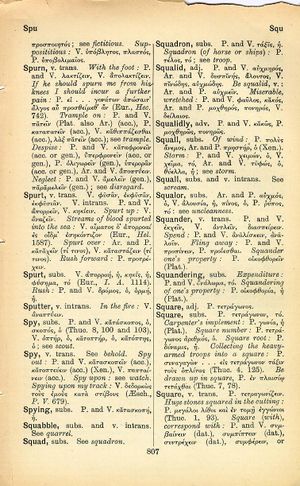squalor
κρείσσων ἐναρχόμενος βοηθῶν καρδίᾳ τοῦ ἐπαγγελλομένου καὶ εἰς ἐλπίδα ἄγοντος· δένδρον γὰρ ζωῆς ἐπιθυμία ἀγαθή (Proverbs 13.12 LXX) → One who sincerely sets about helping is better than one who makes promises leading to hope; for a kindly urge is a tree of life.
English > Greek (Woodhouse)
subs.
Ar. and P. αὐχμός, ὁ, V. ἀλουσία, ἡ, πίνος, ὁ, P. ῥύπος, τό: see uncleanness.
Latin > English (Lewis & Short)
squālor: ōris, m. Sanscr. kālas, black; Gr. κελαινός, κηλίς.
I In gen., stiffness, roughness: quaecumque (res) aspera constat, Non aliquo sine materiae squalore reperta est (opp. lēvor), Lucr. 2, 425.—
II In partic., stiffness from dirt, dirtiness, filthiness, foulness, squalor (the predom. signif. of the word; syn.: sordes, illuvies).
A Lit.
1 In gen.: immundas fortunas aequum est squalorem sequi, Plaut. Cist. 1, 1, 115: squaloris plenus ac pulveris (opp. unguentis oblitus), Cic. Verr. 2, 3, 12, § 31: obsita erat squalore vestis, Liv. 2, 23, 3: illuvie, squalore enecti, id. 21, 40, 9: ignavis et imbellibus manet squalor (corresp. to crinem barbamque submittere), Tac. G. 31: senex macie et squalore confectus, Plin. Ep. 7, 27, 5: vitis squalore deciso, Plin. 34, 14, 39, § 138: squalore situque posito, Calp. Ecl. 1, 43.—
2 Esp., of places: locorum squalor et solitudines inviae militem terrebant, desolation, Curt. 5, 6, 13; cf.: silva squalore tenebrarum horrenda, Amm. 17, 1, 8.—
3 So esp. freq. of filthy garments, as a sign of mourning: decesserat ex Asiā frater meus magno squalore, sed multo majore maerore, Cic. Sest. 31, 68: aspicite, judices, squalorem sordesque sociorum, id. Verr. 2, 5, 48, § 128; so (with sordes and luctus) id. Clu. 6, 18; 67, 192; id. Mur. 40, 86; id. Planc. 8, 21; id. Att. 3, 10, 2; Metell. ap. Cic. Fam. 5, 1, 2; Liv. 29, 16, 6; Quint. 6, 1, 33; with maestitia, Tac. H. 1, 54.—
B Trop.: deterso rudis saeculi squalore, i. e. in language, Quint. 2, 5, 23: Gallus, ex squalore nimio miseriarum, ad principale culmen provectus, i. e. from the very lowest rank, Amm. 14, 1, 1.

